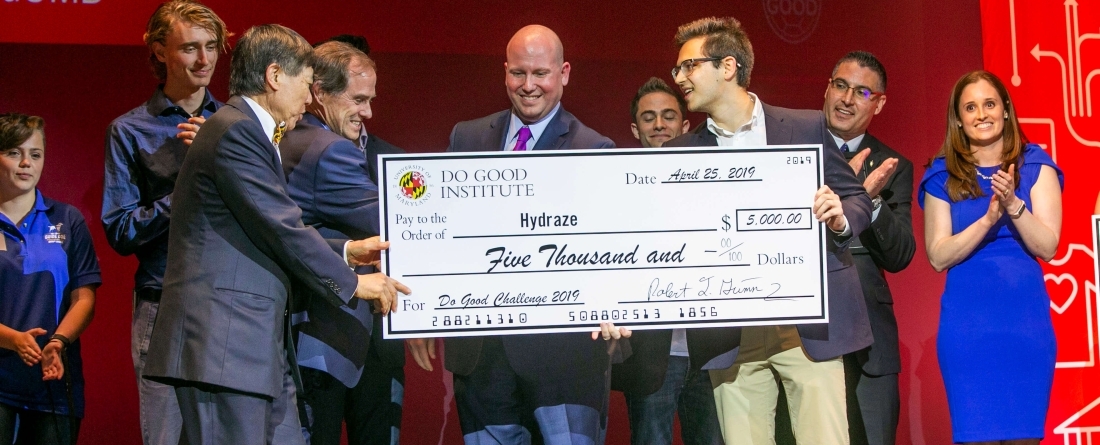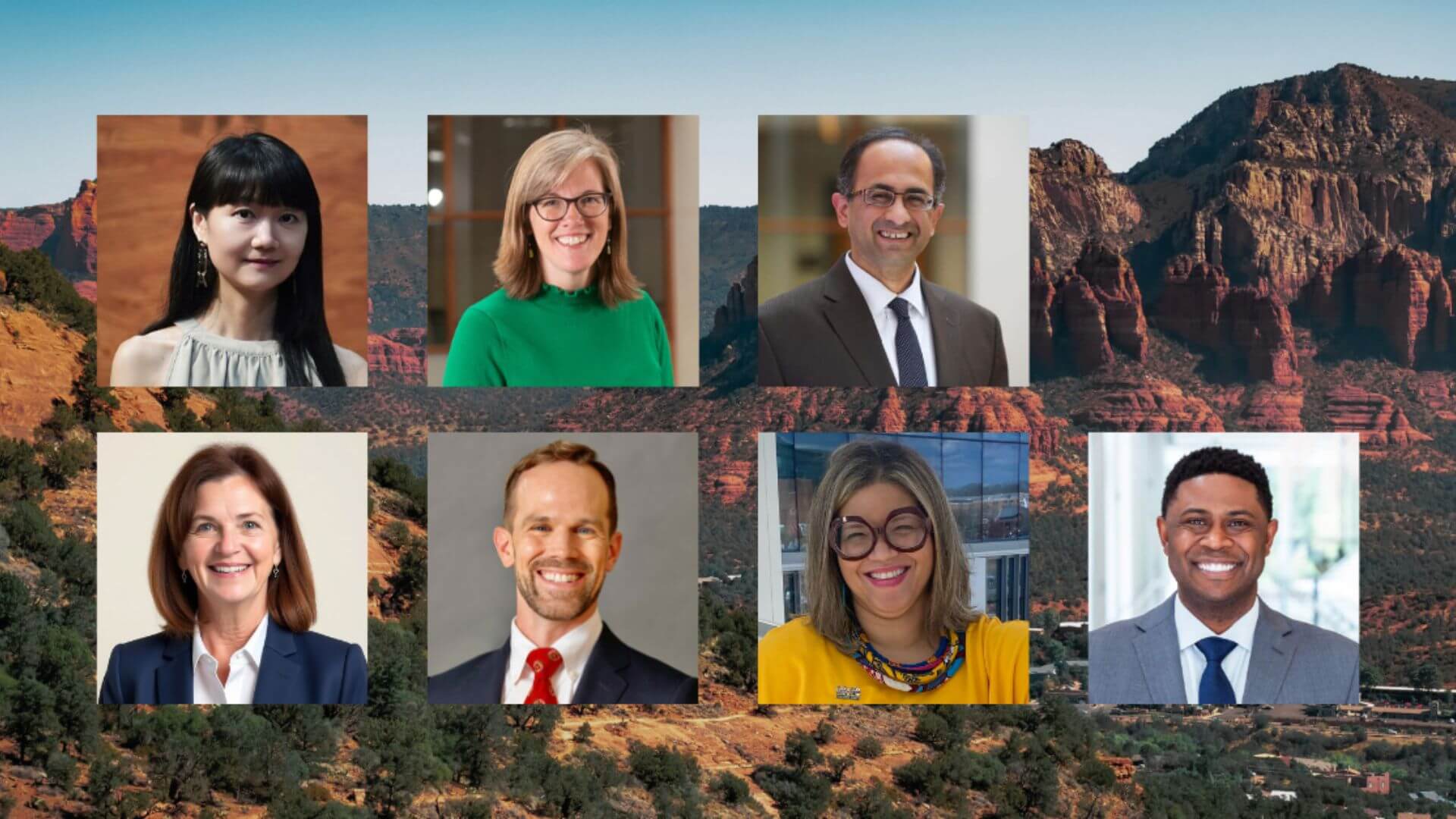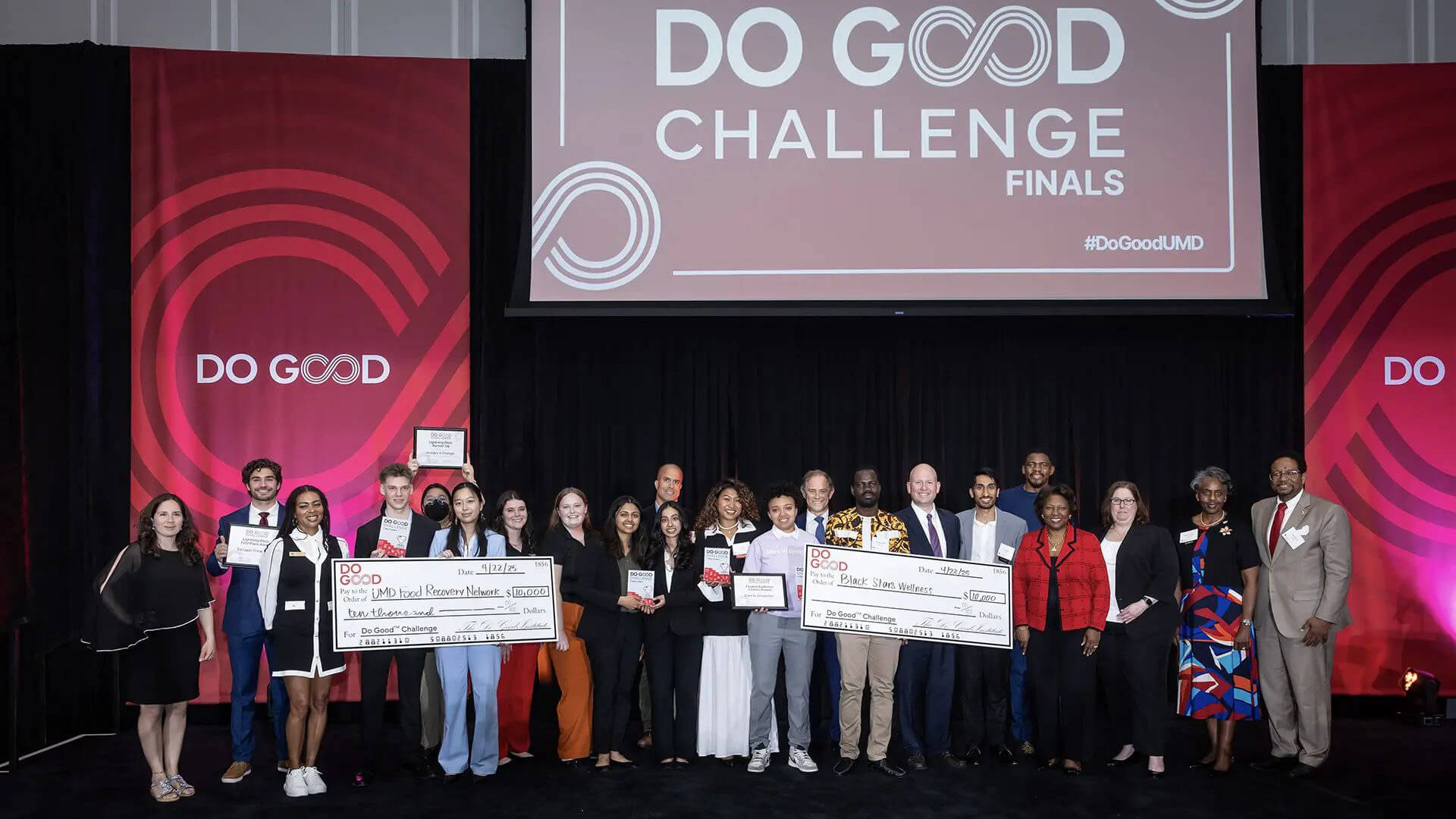
Kay Theatre was filled with students, faculty, staff and community members all waiting to watch six final teams compete in the 8th Annual Do Good Challenge on April 25. At the end of the night, FLAME and Hydraze were each awarded the first place prize of $5,000 for their Do Good project and venture.
Three finalist teams competed in the project track and three teams competed in the venture track during the Challenge. Students were given time to pitch their Do Good project or venture on stage for the audience and judges. This year’s prizes totaled more than $20,000.
Director of the School of Public Policy’s Do Good Institute Robert T. Grimm Jr. welcomed the crowd and introduced UMD President Wallace Loh to start the event.
“America is great because Americans do good,” Loh said. “Today, what we call doing good is citizenship in action. Doing good is not a quality we’re born with, it’s hard work that’s learned.”
Before the finalists wowed the audience with their impact, two panels of judges were introduced, one for the projects and one for the ventures. This year's distinguished panels of judges included: Rosie Allen-Herring, president and CEO, United Way National Capital Region: Nicky Goren, president and CEO, Eugene and Agnes E. Meyer Foundation; Paul Monteiro, chief of staff, Howard University; boardmember, Prince George's County Board of Education; Dan Porterfield, president and CEO, Aspen Institute; Dana Priest, two-time Pulitzer prize winner, John S. and James L. Knight Chair in Public Affairs Journalism, University of Maryland; and Ben Simon, CEO, Imperfect Produce.
First up in the competition was Camp Kesem, an organization dedicated to supporting children who have been impacted by a parent’s cancer. The group hosts a week-long free camp for those children. “Five million children are affected by a parent’s cancer,” said student presenter Devin Cain. Camp Kesem provides kids with “the best week of their lives.” As a chapter of a larger nonprofit, Camp Kesem at UMD managed to raise more than $100,000 in their first year of operation. The funds from the Do Good Challenge would allow the group to create a recruitment video and produce a charity concert to raise additional funds for the camp.
Next was FLAME, a group that works to empower the next generation of STEM leaders. The students in the organization support the academic and social development of 100 students from underrepresented groups. Volunteers deliver weekly lessons in scientific topics, hands-on experiments and projects at Charles Carroll Middle School and Adelphi Elementary School in Prince George’s County. UMD student Natalia Ochman said mentorship can help more underrepresented students develop an interest in STEM. “This is a phenomenon that can be fixed in our school systems,” she said. The funds from the challenge will help FLAME increase their mentors and expand to two new schools in the area.
Public Health Without Borders was the last team to pitch in the project track. Their group works to provide health education to students around the world. The volunteers identify partner communities, conduct needs assessments in those communities, develop workshops, travel on workshop trips and evaluate the programs afterwards. Currently the group has gone to Peru, India, Sierra Leone and Langley Park in Maryland to produce their workshops. Funds from the Do Good Challenge will help the group travel next year to organize a medical supply drive in India and expand their organization to additional Big 10 schools.
Hydraze kicked off the venture track portion of the challenge. Charles Grody presented his pitch for a proprietary water-sensing and automatic flushing device called Hydraze. The device is currently being piloted at the Clarice Smith Performing Arts Center on the UMD campus. “Auto-toilets phantom flush at a rate of 45 percent of the time,” Grody said. He added that an estimated $2 million is being wasted in phantom flushes at UMD each year. Hydraze works with a door latch to allow the toilet to flush when the user leaves the bathroom stall, which cuts down on phantom flushes. Prize money from the challenge will allow the group to accelerate the pilot phase and increase the number of devices in buildings on campus.
Next up was Padres Preparados Jóvenes Saludables, a health app for Latino immigrant families with adolescent children. The app aims to help families cut down on obesity in children by improving fathers’ and male caregivers’ parenting skills. “Family-based programs which include fathers can be a game changer,” the group said. The app allows fathers to learn strategies to improve their children’s nutrition. Money from the Do Good Challenge would help the group redesign their app and increase their resources library, as well as apply for an NIH grant.
Synapto was the last group to pitch. The company is working to revolutionize Alzheimer’s diagnosis using a portable EEG and Machine Learning. Their technology would make diagnosis more accessible, effective and accurate. “Currently, diagnosis costs $4,000, happens too late and is not standard,” the group said. The funds from the challenge would go toward the purchase of additional patient data so the company can continue to conduct research.
During the judges’ deliberation period, audience members participated in the Audience Choice Awards. Each member of the audience was give the opportunity to text in a vote for their favorite finalist team to win an additional $2,500. The audience chose Camp Kesem as the Audience Choice winner.
Prior to the finals competition, attendees were given “Do Good Dollars” to vote on semi-finalist teams to earn money for their causes. The two semi-finalist teams with the most “Do Good Dollars” during the Showcase presented lightning pitches on stage. The audience then texted to vote for their favorite of the two semi-finalist teams to win additional money. Pawsible was awarded first prize and $750; Roots Africa won second place and $500 for their group.
Following the judges’ deliberation, FLAME and Hydraze won first place in their respective categories. Camp Kesem and Synapto earned second place and $2,500 for their groups. Public Health Without Borders and Padres Preparados, Jóvenes Saludables were awarded third place and $1,000 each.
The Do Good Challenge was founded by the UMD School of Public Policy’s Do Good Institute. This year's Challenge Finals was sponsored by Morgan Stanley Private Wealth Management, Rothschild Family Foundations, the Richard E. and Nancy P. Marriott Foundation. You can learn more about the Challenge at go.umd.edu/dogoodchallenge.
View photos of this year's Challenge on the SPP Flickr account.



